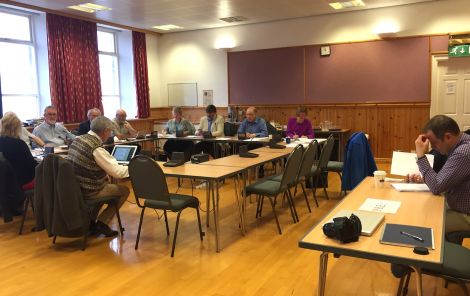News / SCT moves to reduce council trustees
SHETLAND Charitable Trust has approved controversial proposals to reduce the number of council trustees from seven to four.
An amendment to refer the proposals back to the trust’s governance advisory committee for reconsideration was defeated by eight votes to two.
An attempt by vice-chairman Jonathan Wills to table an amendment seeking up to eight trustees being directly elected was not permitted.
During Thursday morning’s passionate and at times stormy debate, during which several speakers warned against “politicising” the trust, it became quickly clear that a majority of trustees had no interest in following Dr Wills’ well-published proposals.
Trustee Allison Duncan accused chairman Bobby Hunter of dictatorship after receiving a letter warning him not to speak publicly about trust business.
Supporting Dr Wills’ amendment he said he would go even further and suggest the election of all 15 trustees, added that he would “not shut up” and did not need a letter from the chairman telling him what to do.
Just five members of the public followed the spirited debate at the Islesburgh Community Centre, and only ten of the currently 14 trustees were present.
Campaigner Peter Hamilton briefly disrupted the meeting by accusing the trustees to rely on one-sided advice from the Institute of Directors (IoD).
Chair of the trust’s audit and governance advisory committee, Keith Massey, said it was important to acknowledge that although the £230 million trust was unique in Scotland, it was not accountable to the community or the local authority but to charities regulator OSCR.
He described the current review of its governance set-up as “minor” in contrast to the “major reorganisation” in 2012, when the number of councillor-trustees was reduced from 22 to seven.
However, Wills warned that this “process, if going through” would prevent the public from ever gaining access to the trust again.
Become a member of Shetland News
“The money in the trust originated as public money, there is a public character to the trust, it is only right that the people of Shetland should have some representation on the trust.
“It is not responsible to the people of Shetland, it is responsible to OSCR and to its trust deed, but there is a very clear link between the public and the trust, and I think the vast majority of the public wants an elected trust. I am not against appointed trustees, I think they do a great job,” he said.
Massey said that the trust would now submit its proposals to OSCR for approval. That process could take another six months and it is up to the charity watchdog to decide how and to what extent they want to consult the public.
The charitable trust would also initiate discussions with Shetland Islands Council as to the number of councillors on the trust, he said.
It is no secret that in order to avoid “institutionalised conflicts of interests”, the leader of the council and a significant number of councillors do not wish have any councillors on the trust.
Following the meeting Massey said that the committee had not made up its mind as how to appoint future trustees.
He said he and others were very well aware of the issues of gender and age imbalance on the trust, and he was keen to explore ways of attracting a wider section of the community to the trust.
“There is nothing wrong with electing trustees. Nobody has said that new trustees have to be appointed. Nobody has said that.
“There are pros and cons in the process of election, what we need to do is satisfy the regulator that whatever we come out with is something that enables us to meet the trust deed.
“If for example we wanted to trial an election process, than that is something for the trust to decide at a future discussion.
“What we will do as audit and governance is come back and say that we will look at the pros and cons in more detail about election versus selection; so it never has been ruled out of the equation,” he said.
“Whatever we do has to meet the requirements of OSCR in making sure we don’t politicise the organisation, making sure we can meet our trust deed, making sure we’ve got the right skills; there are lots of way how we can do it.”
Wills meanwhile called on local people to express their opinion directly to OSCR.
Chairman Bobby Hunter said: “We have seen some fairly different opinions and we have carried it out in a civilised and orderly manner of debate, and have come to an conclusion. That is the strength of the trust.”
He declined to comment on the letter he sent to fellow trustees warning them of speaking to the local media.
Become a member of Shetland News
Shetland News is asking its many readers to consider paying for membership to get additional features and services: -
- Remove non-local ads;
- Bookmark posts to read later;
- Exclusive curated weekly newsletter;
- Hide membership messages;
- Comments open for discussion.
If you appreciate what we do and feel strongly about impartial local journalism, then please become a member of Shetland News by either making a single payment, or setting up a monthly, quarterly or yearly subscription.































































